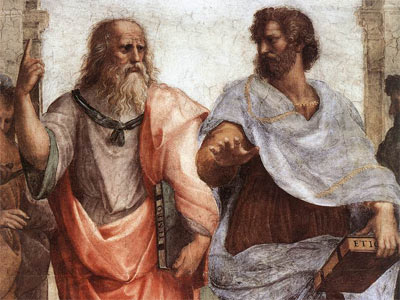Western Civilization's Life Coach
Mini Teaser: A new survey of Western thought begins in bombast and ends in triviality.
But perhaps the most curious aspect of The Cave and the Light is the way in which Herman seems to want to downplay the Western tradition as fundamentally Christian. If, as Herman claims, the influence of Plato and Aristotle down through the centuries was “the greatest intellectual and cultural journey in history,” then in a sense he is forced to write from the perspective of Christianity being only one stop, however long and important, on that trip. It is not only the obvious fact that neither Plato nor Aristotle was Christian. After all, Augustine or Aquinas could be adduced to deal with that. Rather, it is the fact that Herman’s depiction of our own times is almost ostentatiously post-Christian. He does emphasize the spiritual needs to which Platonism and its heirs seem to be able to respond while Aristotelianism cannot. But this spirituality has no specific content, and certainly no particularly Christian content. Indeed, near the end of his book, Herman speaks not of Jesus Christ dying for the sins of humankind, but instead avers that all of Western history can be summed up as “a battle founded, in the last analysis, on the irreconcilable contradiction between Plato’s God and Aristotle’s Prime Mover.”
Given all the historical elements this analysis forces Herman to downplay or at times ignore, this claim seems much more far-fetched than the traditional understanding, well articulated in the modern era by Pope John Paul II, of Western civilization as a fundamentally Christian construct, to which, unquestionably, the thought of both Plato and Aristotle made important contributions. But then, Herman does appear to have an awfully pagan understanding of Western identity. When he writes that “tension and renewal are our [Western] identity,” he begins to sound more like a member of some mystery cult of the Roman era—Mithraism comes to mind, though there were others—than either a Greek philosopher or a Christian. And why he thinks that rediscovering that identity might allow the West to “save the world” is not the smallest puzzle of this comically pretentious excursus into the past.
David Rieff is the author of eight books, including A Bed for the Night: Humanitarianism in Crisis (Simon & Schuster, 2003) and At the Point of a Gun: Democratic Dreams and Armed Intervention (Simon & Schuster, 2005).
Pullquote: To say that one can understand all the major political events in Western history as somehow being expressions of the spirit of Plato or Aristotle really does stretch credulity.Image: Essay Types: Book Review
Essay Types: Book Review 